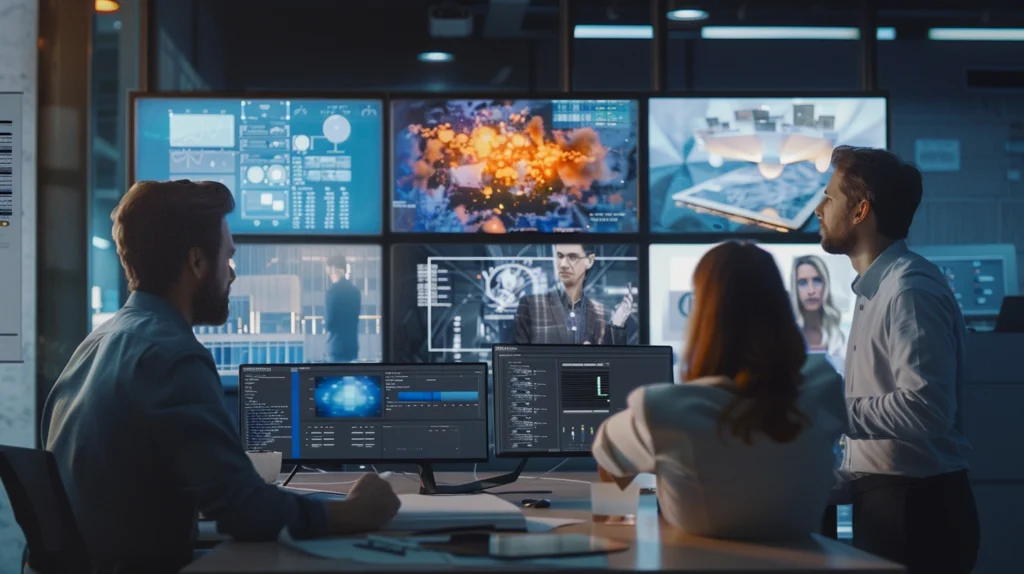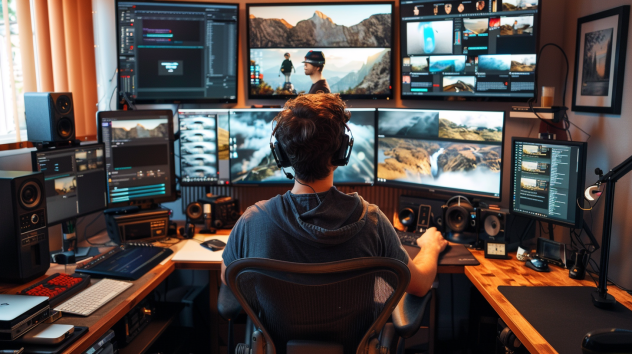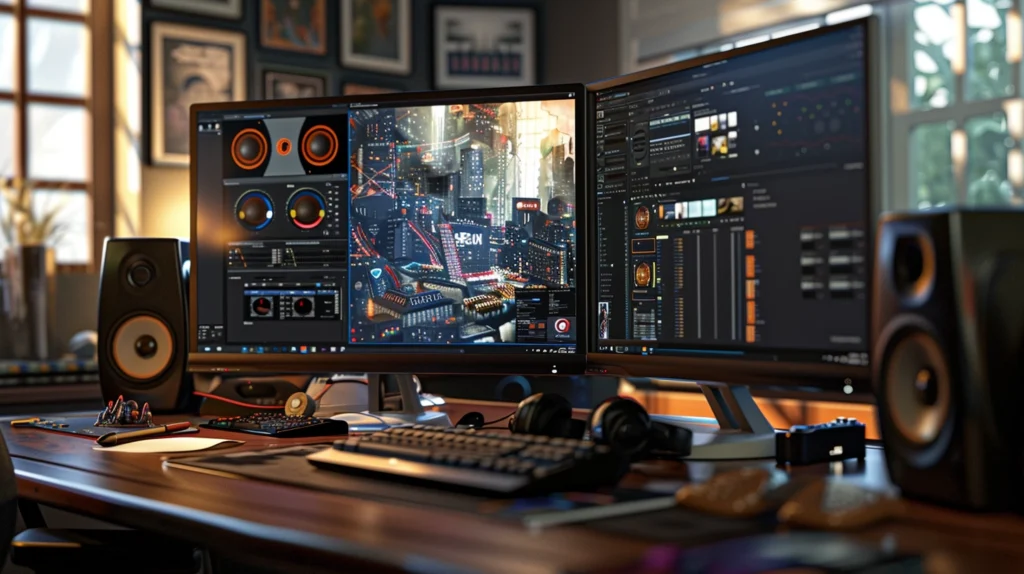Introduction

In today’s digital-first world, the role of a multimedia specialist is more crucial than ever. These professionals are the architects behind the compelling visuals, dynamic websites, and interactive online experiences that captivate audiences across the globe. As digital platforms evolve and new technologies emerge, multimedia specialists adapt and innovate, keeping communication at the forefront of engagement and technology.
Employers seeking the definitive job description template for a Multimedia Specialist, look no further. Click the link below for a direct download of our comprehensive template, crafted meticulously to embody the core principles and best practices of C9Staff’s renowned hiring methodology. This resource is not just a template—it’s a foundation on which you can build precise and effective hiring specifications tailored to attract top talent in multimedia. Equip yourself with the tools to streamline your recruitment process and secure the ideal candidate by utilizing our expertly designed job description.
MULTIMEDIA SPECIALIST JOB DESCRIPTION TEMPLATE

Whether you are an employer seeking to enhance your team’s capabilities by hiring top-tier talent, or an ambitious professional aiming to carve a niche or elevate your career in this vibrant industry, this guide is your comprehensive resource. Here, we delve into what makes a successful multimedia specialist, from essential skills and tools to the latest industry trends and career opportunities. Our goal is to equip you with knowledge and strategies that bridge the gap between current professional status and future career aspirations in multimedia.
Now, consider this: Did you know that businesses leveraging advanced multimedia strategies see a 50% higher engagement rate on social media? Or have you ever wondered how multimedia innovations can transform your brand’s reach and reputation overnight? These questions are not just hypothetical—they address real outcomes driven by proficient multimedia specialists who excel in transforming abstract concepts into concrete, engaging digital realities.
As we commence on this journey through the multifaceted world of multimedia, we invite you to explore how mastering this craft is not only about enhancing personal skills but also about driving significant business impact and shaping the future of digital communication.
Behind the Screens: A Day in the Life of Ashley, Multimedia Specialist
Understanding the Role of a Multimedia Specialist

A multimedia specialist is not just a title; it’s a dynamic and essential role that intersects creativity and technology. In the realm of digital communication, these professionals wield the tools and skills necessary to meld audio, video, text, and graphics into seamless, engaging content that resonates across a spectrum of platforms—from websites and social media to interactive installations and beyond. In industries as varied as advertising, education, entertainment, and technology, the expertise of multimedia specialists is crucial. Their work not only captivates but also conveys complex messages in an intuitive manner, making their role critical to the success and competitiveness of modern businesses.
At the core of a multimedia specialist’s responsibilities lies the creation and management of digital content. This might involve designing eye-catching graphics, editing compelling video pieces, developing strategic online marketing campaigns, and overseeing the distribution of content across digital platforms. For instance, consider a day in the life of a multimedia specialist in an advertising agency: the morning could be spent tweaking graphic designs for an upcoming campaign, the afternoon dedicated to editing a client’s promotional video, and the evening planning social media strategies that synchronize with both.
The toolkit of a multimedia specialist is diverse and ever-evolving. Proficiency in Adobe Creative Suite (Photoshop, Illustrator, Premiere Pro) is almost requisite, as these applications are fundamental for graphic design and video editing tasks. Similarly, a strong understanding of web development technologies like HTML and CSS is essential for crafting and managing online content. Some multimedia roles may also require a basic knowledge of programming to fully customize the functionality of digital projects. Each of these skills enhances the specialist’s ability to not only participate in various stages of content creation but also to innovate and push boundaries.
Imagine you’re crafting a campaign that captures the public imagination and goes viral overnight. This is the power of effective multimedia—turning ideas into visually stunning and interactive experiences that engage and inspire. As a multimedia specialist, your ability to combine artistry with digital savvy can make monumental impacts on a brand’s visibility and consumer engagement.
As we delve deeper into the qualifications and skills in the following sections, remember that the field of multimedia is characterized by rapid technological advances and shifting consumer preferences. Success in this career requires not just skill and creativity, but also adaptability and a commitment to continuous learning. This readiness to evolve is what prepares a multimedia specialist for tomorrow’s challenges while excelling in today’s digital landscape.
For Employers - Hiring a Multimedia Specialist

Understanding how to align your hiring strategies with your business objectives is crucial in securing a multimedia specialist who not only fits your immediate needs but also contributes to your long-term goals. As an employer, it’s essential to first identify the specific needs that a multimedia specialist can fulfill within your organization. These professionals can dramatically enhance your digital marketing efforts, create engaging multimedia content, and revolutionize how you interact with customers. They bring a blend of technical skills and creative vision that can propel your brand’s digital presence forward.
Identifying Your Needs
Start by assessing the gaps in your current team’s capabilities. Do you need someone who can lead your digital campaigns, or perhaps someone who can overhaul your web design with a fresh, innovative approach? A multimedia specialist can wear many hats; determining which hat fits your needs is the first step in the hiring process.
Finding Top Talent
Once you understand your needs, the next step is finding the right talent. Platforms like LinkedIn, Behance, and industry-specific job boards are invaluable resources. LinkedIn allows you to reach professionals who may not be actively searching for a job but are open to opportunities. Behance showcases portfolios, giving you insight into the candidate’s aesthetic and technical skills before the interview. Crafting compelling job descriptions is crucial; they should highlight not only the technical requirements of the role but also the creative freedom and growth opportunities that come with it.
Evaluating Candidates
Evaluating potential hires is more than verifying technical skills—it’s about understanding their ability to innovate and solve problems creatively. During interviews, ask candidates to describe projects where they integrated multiple media formats to achieve a business goal. This reveals their approach to multimedia projects and their ability to think strategically about content and design. Behavioral questions can further help assess how they handle challenges and collaborate with teams on complex projects.
Integration into Your Team
Integrating a new multimedia specialist into your team is a critical step that goes beyond the initial hiring process. Best practices for onboarding include:
Cross-departmental introductions: Ensure they meet team members from different departments they’ll be working with, which can foster collaboration and understanding.
Immersion in company culture: Help them understand your company’s values and operational rhythms to ensure a smooth transition.
Alignment with ongoing projects: Quickly involve them in current projects where they can make immediate contributions, which helps in building their confidence and establishing their role within the team.
Employers seeking the definitive job description template for a Multimedia Specialist, look no further. Click the link below for a direct download of our comprehensive template, crafted meticulously to embody the core principles and best practices of C9Staff’s renowned hiring methodology. This resource is not just a template—it’s a foundation on which you can build precise and effective hiring specifications tailored to attract top talent in multimedia. Equip yourself with the tools to streamline your recruitment process and secure the ideal candidate by utilizing our expertly designed job description.
MULTIMEDIA SPECIALIST JOB DESCRIPTION TEMPLATE

For Candidates - Becoming a Multimedia Specialist

Commencing on the path to becoming a multimedia specialist entail navigating through a varied educational and professional landscape. This journey begins with selecting the right educational pathway. Whether you’re considering a traditional degree in graphic design, digital media, or computer science, or opting for certifications and self-taught methods, each avenue offers distinct benefits and challenges. Traditional degrees typically provide a comprehensive foundation and networking opportunities but may involve significant time and financial investment. In contrast, certifications and self-directed learning can be more flexible and focused, allowing you to tailor your education to specific skills or technologies quickly.
As you develop your skills, building a compelling portfolio becomes essential. This portfolio should be a curated showcase of your range, including everything from video clips and digital graphics to interactive web designs. It should not only demonstrate your technical abilities but also your creative vision. Utilize digital platforms like Behance or your own personal website to present your work effectively. Tailoring your portfolio to different audiences—whether potential employers or freelance clients—will help you highlight the most relevant projects and skills for each opportunity.
Finding job opportunities in the multimedia field involves leveraging both your professional network and the tools at your disposal. Networking remains a powerful tool, so engage actively both online and offline. Utilize platforms like LinkedIn to connect with industry professionals, and don’t shy away from attending conferences or participating in forums related to multimedia and digital arts. When applying for positions, ensure your resume and cover letter are concise and well-designed, reflecting the skills and creativity of a multimedia specialist.
Finally, consider your long-term career advancement. The field of multimedia offers diverse paths, from corporate roles to freelance opportunities and entrepreneurial ventures. Stay current with industry trends and continue your education through advanced courses and new software training. This commitment to learning will not only enhance your skill set but also ensure you remain competitive and relevant in a rapidly evolving industry.
Throughout this section, remember that your journey is unique. Use this guidance to inspire and motivate yourself to take proactive steps towards a successful career in multimedia. With determination and the right strategy, you can shape a rewarding path that not only meets your career goals but also fulfills your creative aspirations.
Are you ready to supercharge your career and land your dream job? C9Staff is here to help you unlock exciting opportunities tailored to your skills and aspirations. Click the link below to submit your resume to our talent acquisition team. If your qualifications align with our client requirements, we will reach out to discuss potential opportunities that match your profile. Don’t miss this chance to advance your career with roles that truly fit your expertise and ambitions.

Trends and Future of Multimedia Specialists

Step into the cutting-edge world of multimedia technology, where the boundaries of creativity and functionality are constantly expanding. Today’s trends are not just shaping the multimedia industry; they are revolutionizing how we engage with the world. Technologies like virtual reality (VR), artificial intelligence (AI) in design processes, and interactive content are leading this charge. In advertising, VR allows consumers to experience products in lifelike simulations, enhancing decision-making and engagement. In education, AI-driven tools are creating personalized learning experiences, making education more accessible and effective. Entertainment has been transformed by interactive content that allows viewers to choose their own adventure in stories.
As we look to the future, these technologies are poised to redefine the role of multimedia specialists across all industries. Imagine a world where AI handles routine content creation, freeing up specialists to focus on complex, creative projects. VR could become a commonplace tool for interactive marketing campaigns, requiring you to master 3D modeling and real-time rendering.
To thrive in this evolving landscape, you will need to embrace continuous learning and adaptability. Skills such as coding for immersive environments and data analytics for measuring user engagement will become crucial. The ability to quickly learn and integrate new software and tools into your workflow will set you apart from the competition.
Let this be a call to action: view these changes not just as challenges, but as opportunities to lead and innovate in your field. The future of multimedia is a canvas for your creativity—equip yourself with the latest technologies and be ready to paint your masterpieces.
Remember, the future belongs to those who are prepared. By embracing these trends and continuously enhancing your skills, you will not only adapt to the changes in multimedia but will be at the forefront, shaping the industry’s future. Engage deeply with these innovations, and you’ll find yourself not just participating in the field but leading it.
Resources and Tools for Mastery
To excel as a multimedia specialist, arming yourself with the right tools and resources is crucial. Begin by building a robust toolkit that includes industry-standard software and applications essential for any multimedia professional. Here’s a guide to some must-have tools:
Adobe Creative Suite: This suite is a cornerstone for any multimedia professional, featuring key programs like Photoshop for image editing, After Effects for motion graphics, and Premiere Pro for video editing. Each tool is designed to provide a comprehensive set of capabilities to enhance your creative projects.
Maya: For those specializing in 3D animation, Autodesk Maya offers powerful modeling and animation tools that help bring lifelike animations and visual effects to life. Its versatility in handling complex simulations makes it indispensable.
Audacity: A vital tool for audio editing, Audacity allows you to record, edit, and mix sound. It’s invaluable for podcast production, sound effects, and other audio enhancements.
As you equip yourself with these tools, also focus on deepening your knowledge and refining your skills through various learning resources:
Books: Titles like “Designing Brand Identity” by Alina Wheeler offer insights into foundational concepts and advanced techniques in design. “Digital Multimedia” by Nigel Chapman provides a comprehensive overview of the theory and practice of multimedia production.
Online Courses: Platforms such as Coursera, Udemy, and LinkedIn Learning offer courses in cutting-edge topics like virtual reality, interactive content creation, and AI in multimedia. These courses are often led by industry experts and provide practical, hands-on learning experiences.
Websites and Forums: Engage with platforms like Behance to showcase your work and connect with other creatives, or participate in forums like Stack Exchange’s Graphic Design community for troubleshooting and advice.
To truly master the craft of multimedia, don’t just accumulate knowledge—apply it. Use these tools and resources to experiment with new techniques, tackle challenging projects, and continuously push the boundaries of what you can create. Stay proactive in learning; the multimedia field evolves rapidly, and staying abreast of new technologies and methodologies is key to maintaining a competitive edge.
Remember, each resource is a stepping stone to greater expertise and deeper understanding. By actively seeking knowledge and embracing these tools, you set yourself on a path toward mastering your craft and advancing your career as a multimedia specialist. Keep pushing yourself to learn and grow—the possibilities are limitless.
Employers looking to enhance their team with a top-tier Multimedia Specialist are invited to discover how C9Staff can streamline your hiring process. By clicking the link below, you can schedule a free exploratory call with one of our experienced account managers today. During this call, we will meticulously listen to your specific needs and provide recommendations for potential candidates at no cost. This is your opportunity to evaluate the best talent available and ensure competitive pricing. Don’t miss out on finding the perfect addition to your team.

Conclusion

Throughout this guide, we’ve explored the multifaceted role of multimedia specialists, highlighting their pivotal contributions across various sectors such as marketing, education, and entertainment. These professionals wield an array of essential skills and cutting-edge technologies—from Adobe Creative Suite for crafting stunning visuals to HTML/CSS for robust web design, and from the immersive realms of virtual reality to the predictive powers of artificial intelligence.
Now, the call to action is clear. For employers, it’s time to refine your hiring strategies to better align with the evolving demands of digital communication. Seek out those who not only have the technical skills but also the creative capacity to propel your projects forward. For aspiring multimedia specialists, you are encouraged to vigorously pursue your educational and career goals. Utilize the pathways, portfolio tips, and job searching strategies laid out in this guide to carve out a successful niche in this dynamic and ever-evolving field.
As we stand on the brink of digital revolutions, remember that multimedia specialists are not merely adapting; they are at the forefront, driving the change. They transform everyday communication into an art form that reaches and inspires millions. Let this be your inspiration:
“In the evolving landscape of digital communication, the role of multimedia specialists is becoming not just influential but essential. Their ability to blend technology and creativity is shaping the future, turning every interaction into a potential masterpiece.”
Take this knowledge and use it to fuel your journey, whether you’re shaping strategies, crafting content, or pioneering new technologies. The future of digital communication is in your hands, and it promises to be as transformative as it is dynamic. Embrace it, and let your skills lead the way to new horizons.



